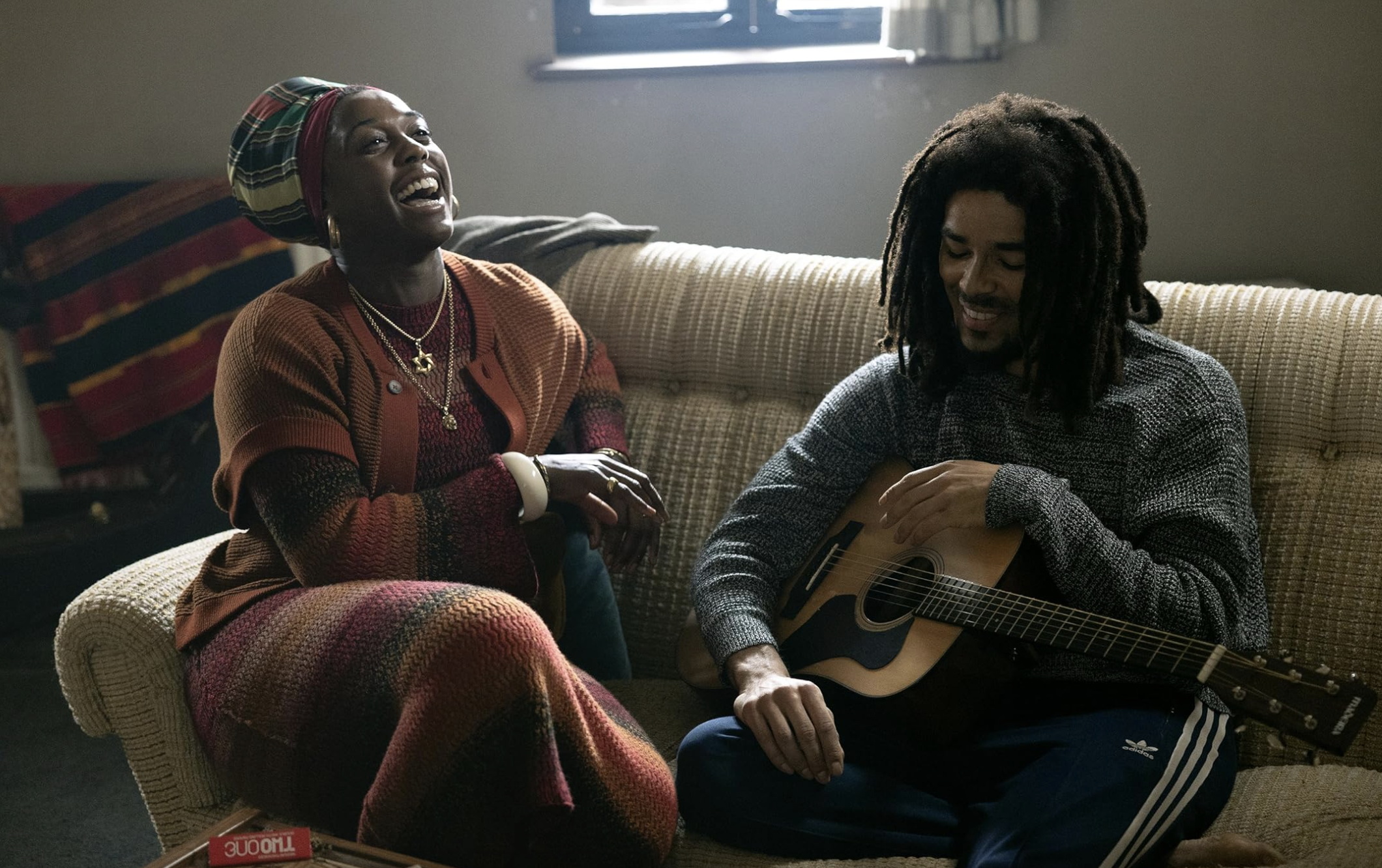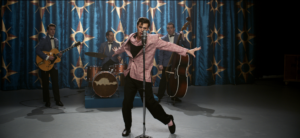There’s no shortage of Bob Marley movies. Filmmakers have been telling the reggae superstar’s story for decades: Bob Marley and the Wailers: The Bob Marley Story (1984), Time Will Tell (1992), and Bob Marley: Freedom Road (2007) all draw on archival footage and interviews with Marley’s loved ones to give an earnest, authentic account of the man’s life.
The first biopic in this lineage of Marley films, Bob Marley: One Love (2024) tries to continue that legacy into a new format. Because of a floundering plot and hollow writing, it mostly fails.
One Love is set in 1970s Jamaica, the midpoint of Marley’s career, as political violence erupts across the country. Marley (Kingsley Ben-Adir) and his band—which includes his wife, Rita (Lashana Lynch)—are caught in the turmoil when gunmen attack them. Burdened with being the voice of Jamaican peace and unity, yet shaken by his brush with death, Marley flees to England to produce an album in the hopes of easing Jamaica’s political tensions.
Unlike biopics like Elvis (2022) or Bohemian Rhapsody (2018), which cover a broad swath of their subjects’ lives, One Love covers less than a year of Marley’s. That decision had promise; a memoir-like structure would let the film tell a more focused story.
“We chose this timeline because that was the best time…to capture a moment of musical genius,” Reinaldo Marcus Green, director of Bob Marley: One Love, said in an interview with the Voice. “Really, for me, [it was] the moment that took Bob from being a musician to a revolutionary.”
But One Love falls short of its director’s ambitions. After an action-packed beginning—which contains Bob’s failed assassination, his recovery, a concert in the aftermath, and his decision to temporarily move to England—the story falters.
As the film moves out of Jamaica, the violence in the country—initially the central conflict of the film—loses narrative importance. After abandoning this element of Marley’s story that differentiates it from the litany of other biopics, the plot trudges through a tired pattern: the band gradually creating their album, going on tour, and schmoozing European aristocrats.
Because One Love’s tight timeframe omits much of Marley’s backstory, Green includes a series of flashbacks to the musician’s childhood and adolescence. These scenes establish important details about Marley’s life, namely his mother’s abandonment, his father’s mistreatment, and his early relationship with Rita. But any insight gained from the flashbacks is superficial.
Despite learning about the circumstances of Marley’s upbringing, we don’t spend enough time with the younger versions of Marley (Nolan Collignon and Quan-Dajai Henriques) and Rita (Nia Ashi) to get any sense of their inner life or character, and their scenes—rarely lasting more than a handful of minutes—feel too rushed to retain any emotional power.
Despite these large plot failings, One Love slightly redeems itself with Ben-Adir and Lynch’s acting prowess. Ben-Adir and Lynch bring a semblance of dyanism to both Marley and Rita, providing somewhat of a new lens to how Western audiences view these larger-than-life figures.
The praise regarding the film’s devotion to Marley’s image must be directed towards Ben-Adir. Marley is generally regarded as an easy-going and amorous, but largely one-dimensional, person; however, Ben-Adir brings an aspect of grittiness to his portrayal. Specifically in studio-based scenes where Marley makes his band run certain songs over and over again, Ben-Adir portrays Marley as a commanding presence (a lá J.K. Simmons in Whiplash (2014)) while maintaining his cool exterior. Ben-Adir brings this diva-like perfectionism to the screen without compromising Marley’s fun-loving and “chill” exterior, creating a more nuanced character than non-Jamaican audiences may be accustomed to.
Ben-Adir’s performance is not the only thing challenging the status quo. Lynch’s depiction of Rita Marley challenges the biopic cliché where the subject’s love interest is a secondary character merely privy to the wants and needs of their significant other; rather, she controls the plot and holds the audience in her hand.
Often driving the emotional narrative and conflicting with Marley over his desire for fame at the expense of his family, Lynch’s excellence in reacting is what makes her performance believable and utterly heartbreaking. In one of the most poignant moments of the film where Rita reacts to Marley’s touch with nothing but a dead stare, Lynch determines the emotional trajectory of the film in a singular moment.
Despite stellar performances from both Lynch and Ben-Adir, there was little the duo could do to overcome larger directorial and script issues. Rita’s character arc is largely static. Though she is often the arbiter of the plot, she is not allocated the luxury of development; Rita maintains her place as Marley’s main adversary for the majority of the film, with their relationship magically reconciling in the last five minutes. Furthermore, Marley rarely ever comes down from his pedestal. With only a faint reference to his egregious infidelity (having six kids with six different women while still married to Rita), it is clear that maintaining Marley’s image was a larger priority than a humanizing portrayal of this larger-than-life legend.
This unsatisfying retelling of Marley’s life is exacerbated by the film’s repeated use of visual metaphor, which features the young Marley running from a fire. It isn’t clear what he’s running from until the end of the film, or whether it’s a memory of Marley’s to begin with. Even when the metaphor is fully revealed at the end of the movie, it’s too pat to be profound.
While One Love excels in terms of casting, the larger plot faults make it a mediocre viewing experience at its absolute best. At its absolute worst, the film is a re-hashed account of Marley’s life with pathetic metaphors that unsuccessfully prescribe larger meaning behind his actions, but is filled to the brim with conspicuous sponsorships, mentions of Ziggy Marley, and cherry-picked storytelling. Carried by Ben-Adir and Lynch, One Love is consistently underwhelming and forgoes the one thing it claims to promise: love.






